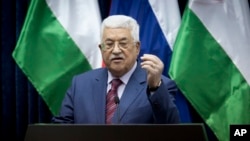The militant group Hamas that rules Gaza moved Sunday to end its decade-long political and territorial split with Palestinian President Mahmoud Abbas's Fatah movement, agreeing to dissolve its administrative body and hold general elections.
With the Gaza economy in shambles and electricity typically on only four hours a day in the Mediterranean coastal enclave, Hamas said it would immediately allow the Abbas-led "unity government" to assume control. The joint government was formed three years ago, but until now has been unable to govern there.
The breakthrough came after separate talks in recent days by Hamas and Fatah delegations with Egyptian intelligence officials in Cairo.
Hamas official Hussam Badran said Gaza officials accepted Abbas' demands to end the stalemate between the rival Palestinian groups "as a sign of our good will toward reconciliation. The administrative committee is now dissolved and the government can come to Gaza today to assume its responsibilities and duties."
Mahmoud Aloul, a Fatah official, welcomed the agreement, but told the Voice of Palestine radio, "We want to see that happening on the ground before we move to the next step."
Fatah official Azzam al-Ahmad said the Abbas group would hold talks with Hamas to work out details of the pact.
"There will be tangible practical steps in the next few days, starting with the Palestinian national unity government resuming its work according to law in Gaza as it does in the West Bank, in order to continue its efforts to relieve the suffering of our people in the strip and work towards lifting the unjust blockade," Ahmad told the Palestinian news agency Wafa.
Israel has blockaded Gaza for a decade, and its border with Egypt has also remained largely closed in recent years. United Nations chief Antonio Guterres, during a visit to the strip in August, called for the blockade to be lifted, saying Gaza was enduring "one of the most dramatic humanitarian crises" he had seen.
In recent months, Abbas has stiffened financial pressure against Hamas, cutting back electricity payments to force Hamas to end the dispute over the rule of the enclave. Hamas has governed the strip and its 2 million residents since 2007, when it fought a short civil war with Fatah. Hamas has been greatly weakened by three losing armed conflicts with Israel since 2008, international isolation and one of the world's highest unemployment rates.
There have been numerous attempts since 2011 by Hamas and Fatah to reconcile, but all failed. They agreed to the unity government in 2014, but Hamas has continued to oversee Gaza with its administrative body.
The 82-year-old Abbas, now 12 years into what was to have been a four-year term as head of the Palestinian Authority, has led Palestinians in the Israel-occupied West Bank. But opinion polls show him to be an unpopular leader, amid projections that Hamas would win parliamentary elections in both Gaza and the West Bank.





